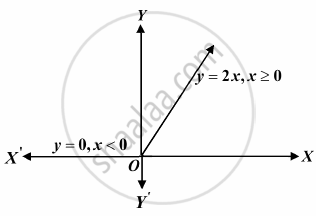Advertisements
Advertisements
प्रश्न
The set of all points where the function f(x) = x + |x| is differentiable, is ______.
विकल्प
(0, ∞)
(–∞, 0)
(–∞, 0) ∪ (0, ∞)
(–∞, ∞)
उत्तर १
The set of all points where the function f(x) = x + |x| is differentiable, is (–∞, 0) ∪ (0, ∞).
Explanation:
f(x) = x + |x| = `{{:(2x",", x ≥ 0),(0",", x < 0):}`

There is a sharp corner at x = 0, so f(x) is not differentiable at x = 0.
उत्तर २
The set of all points where the function f(x) = x + |x| is differentiable, is (–∞, 0) ∪ (0, ∞).
Explanation:
Lf' (0) = 0 and Rf' (0) = 2 ; so, the function is not differentiable at x = 0
For x ≥ 0, f(x) = 2x (linear function) and when x < 0, f(x) = 0 (constant function)
Hence f(x) is differentiable when x ∈ (–∞, 0) ∪ (0, ∞).
APPEARS IN
संबंधित प्रश्न
Differentiate the function with respect to x.
sin (x2 + 5)
Differentiate the function with respect to x.
sin (ax + b)
Differentiate the function with respect to x.
`(sin (ax + b))/cos (cx + d)`
Differentiate the function with respect to x.
`cos x^3. sin^2 (x^5)`
Differentiate the function with respect to x.
`2sqrt(cot(x^2))`
Differentiate w.r.t. x the function:
(3x2 – 9x + 5)9
Differentiate w.r.t. x the function:
`x^(x^2 -3) + (x -3)^(x^2)`, for x > 3
If f (x) = |x|3, show that f ″(x) exists for all real x and find it.
Does there exist a function which is continuos everywhere but not differentiable at exactly two points? Justify your answer?
Discuss the continuity and differentiability of the
If f(x) = x + 1, find `d/dx (fof) (x)`
If y = tan(x + y), find `("d"y)/("d"x)`
If y = tanx + secx, prove that `("d"^2y)/("d"x^2) = cosx/(1 - sinx)^2`
If u = `sin^-1 ((2x)/(1 + x^2))` and v = `tan^-1 ((2x)/(1 - x^2))`, then `"du"/"dv"` is ______.
cos |x| is differentiable everywhere.
sinx2 + sin2x + sin2(x2)
(sin x)cosx
(x + 1)2(x + 2)3(x + 3)4
`tan^-1 ((3"a"^2x - x^3)/("a"^3 - 3"a"x^2)), (-1)/sqrt(3) < x/"a" < 1/sqrt(3)`
If xm . yn = (x + y)m+n, prove that `("d"^2"y")/("dx"^2)` = 0
If `ysqrt(1 - x^2) + xsqrt(1 - y^2)` = 1, then prove that `(dy)/(dx) = - sqrt((1 - y^2)/(1 - x^2))`
A particle is moving on a line, where its position S in meters is a function of time t in seconds given by S = t3 + at2 + bt + c where a, b, c are constant. It is known that at t = 1 seconds, the position of the particle is given by S = 7 m. Velocity is 7 m/s and acceleration is 12 m/s2. The values of a, b, c are ______.
Let S = {t ∈ R : f(x) = |x – π| (e|x| – 1)sin |x| is not differentiable at t}. Then the set S is equal to ______.
If f(x) = `{{:(x^2"," if x ≥ 1),(x"," if x < 1):}`, then show that f is not differentiable at x = 1.
